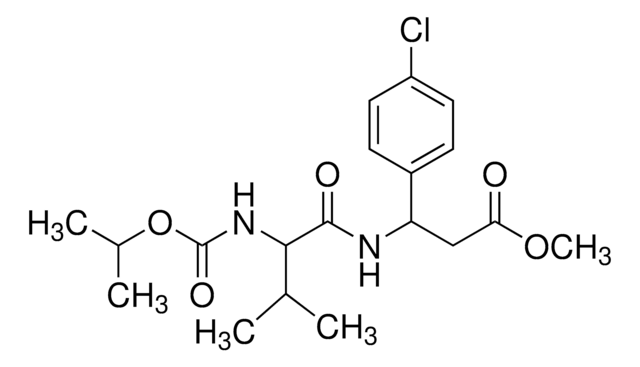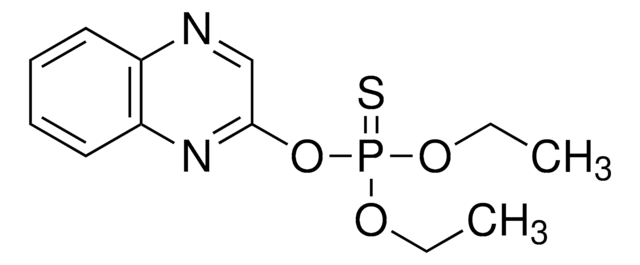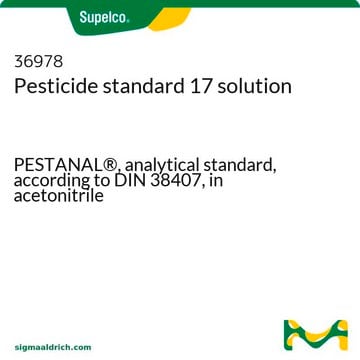40799
Prothiofos
certified reference material, TraceCERT®, Manufactured by: Sigma-Aldrich Production GmbH, Switzerland
About This Item
Recommended Products
grade
certified reference material
TraceCERT®
Quality Level
product line
TraceCERT®
shelf life
limited shelf life, expiry date on the label
manufacturer/tradename
Manufactured by: Sigma-Aldrich Production GmbH, Switzerland
storage temp.
−20°C
SMILES string
CCCSP(=S)(OCC)Oc1ccc(Cl)cc1Cl
InChI
1S/C11H15Cl2O2PS2/c1-3-7-18-16(17,14-4-2)15-11-6-5-9(12)8-10(11)13/h5-6,8H,3-4,7H2,1-2H3
InChI key
FITIWKDOCAUBQD-UHFFFAOYSA-N
Looking for similar products? Visit Product Comparison Guide
General description
Certified content by quantitative NMR incl. uncertainty and expiry date are given on the certificate.
Download your certificate at: http://www.sigma aldrich.com
Prothiofos is a non-systemic insecticide and belongs to the group of organophosphates. It is an acetylcholinesterase (AChE) inhibitor causing hyperexcitation and impedes the functioning of the nervous system. Prothiofos gets activated by contact and ingestion and is used to control caterpillars, Pseudococcus spp., thrips, cockchafer larvae, cutworms, etc. in vegetables, fruit, maize, sugar cane, sugar beets, tea, tobacco, and ornamentals.
According to the Commission Implementing Regulation (EU) No 2076/2002 of 20th November 2002, prothiofos is not approved for use in the European Union (EU) as a plant protection agent, following Regulation (EC) No. 1107/2009. But a default maximum residue limit of 0.01 mg/kg is applicable for the presence of prothiofos in products of plant and animal origin, according to Art 18(1)(b) Reg 396/2005.
Application
Prothiofos CRM may also be used as given below:
- Multi-residue analysis of 160 multiclass pesticides using ethyl acetate (EtAC)/n. hexane mixture for extraction from chamomile, thyme, and marjoram samples and their analysis by gas chromatography-tandem mass spectrometry (GC-MS/MS)
- Evaluation of an automated QuEChERS procedure for the determination of 270 pesticides residues in celery, eggplant, tomato, leek, green tea, corn, grape, and soybean oil samples using liquid chromatography-tandem mass spectrometry (LC-MS/MS) and gas chromatography-triple quadrupole mass spectrometry (GC-MS/MS)
- Gas chromatographic-mass spectrometric (GC/MS) analysis of six organophosphorus (OPPs) pesticides in bell pepper samples after a QuEChERS-citrate method based sample extraction
- Simultaneous determination of 300 pesticide residues in human hair samples by LC- and GC-MS/MS
- Quantification of 255 pesticide residues in vegetable oil samples using modified QuEChERS with GC-MS/MS based method
- Method development to determine 133 pesticide residues in Chenpi samples using a modified QuEChERS method based on ―NH2 sorbent and gas chromatography-tandem mass spectrometry (GC-MS/MS)
Recommended products
Legal Information
Signal Word
Danger
Hazard Statements
Precautionary Statements
Hazard Classifications
Acute Tox. 1 Inhalation - Acute Tox. 4 Oral - Aquatic Acute 1 - Aquatic Chronic 1
Storage Class Code
6.1A - Combustible acute toxic Cat. 1 and 2 / very toxic hazardous materials
WGK
WGK 3
Flash Point(F)
Not applicable
Flash Point(C)
Not applicable
Choose from one of the most recent versions:
Certificates of Analysis (COA)
Don't see the Right Version?
If you require a particular version, you can look up a specific certificate by the Lot or Batch number.
Already Own This Product?
Find documentation for the products that you have recently purchased in the Document Library.
Our team of scientists has experience in all areas of research including Life Science, Material Science, Chemical Synthesis, Chromatography, Analytical and many others.
Contact Technical Service










